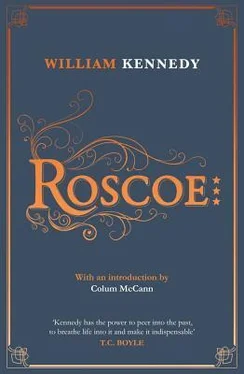“Goddamn you for letting me sleep.”
“You couldn’t stay awake.”
“You tricked me.”
“You couldn’t have done anything.”
“I could have. She’s leaving me.”
“The doctors can’t do anything. And she isn’t gone.”
“She can’t hear me.”
“She may rally.”
“She’s dying and I can’t even say goodbye. You cheated me.”
She stood and waved her arms in a sobbing frenzy and struck Elisha across the face, not an intentional blow, but she did not apologize. Roscoe saw in her face a bitterness he didn’t recognize, a wildness beyond grief. She slumped again to her knees, and Elisha could not comfort her. Roscoe stood witness to the tableau of estrangement, and the changing yet again of intravenous medications that had no effect on the child. Elisha’s sisters came to the waiting room, and Elisha’s brother, Gordon, brought an Episcopal priest who came to deliver the last rites. Veronica refused to let him into the room. “She’s not dying,” she told the priest, “and even if she were, she’s too innocent to need any prayers.”
On the early morning that began the fourth day of the vigil, Rosemary died without regaining consciousness. Veronica cursed Elisha anew: “Bastard, you took her away from me, goddamn you for it.” She wailed and refused Elisha’s touch. Only her howls assuaged her loss and her guilt over the laxative and the failure of her own body, how dare it demand sleep? She cried herself out and stared at the deathbed. Elisha knelt at the foot of the bed but later told Roscoe he could not remember one prayer. He could think of only one sensible thing to say to Veronica: “All you see is loss. Does that wipe out all the joy she gave us while she was alive?”
After half an hour, two nurses came to take Rosemary, but Veronica sent them away. The vigil continued another hour, until two interns came back with the head nurse, who apologized but said she would have to restrain Veronica if necessary. Roscoe told her that if she did it would be her last act as an employee of this or any other hospital in Albany. He took hold of Veronica’s arm and said to her, “I’ll take you both back to Tivoli, where your daughter will live forever.”
Roscoe then walked Mr. and Mrs. Fitzgibbon down to the hospital parking lot. They sat together in the back seat of Roscoe’s new Studebaker, and he then drove them home to their very empty mansion.
Two days after the funeral, Veronica entered the Beth El Jacob synagogue on Herkimer Street as the cantor was singing with his four sons, three wearing hats. The sons had no worldliness in their faces, but much piety. Veronica stood by the door listening. The singing ended and Rabbi Horwitz began to speak to the congregation of bankruptcy, then equated it with moral bankruptcy. “People spend out of control, but then comes the reckoning and we can’t pay,” he said, and Veronica said aloud, “You are absolutely correct,” and walked toward the rabbi and sat among the men of the congregation. Rabbi Horwitz stopped speaking, and a man arose from his seat and told Veronica that she must sit upstairs with the women.
“I can’t do that,” she said. “It’s not my fault that I’m a mother.”
“I’m sorry, but you must move,” the man said.
Veronica stood up and left the synagogue. She drove to Sacred Heart Church in the North End, where her Catholic mother had worshipped. She lit all three hundred votive candles, then knelt at the rail and stared at the white marble altar. Will Logan, the sexton, sweeping the floor at the back of the church, saw her open the marble gates and go up the steps to the altar, take the tabernacle key from under the altar cloth, open the tabernacle door, take out a ciborium half full of the Eucharistic wafers, eat a handful, then begin to eat another. Will came on the run and took the ciborium from her. He put it back in the tabernacle and told her, “You better leave, missus. You can’t do this.”
Later that week, Veronica went to her first session with Nadia the mystic, who swiftly put her in conversation with her dead daughter.
Sale
Elisha left politics in late 1928, two weeks after Rosemary died. He retreated into solitude, refusing all condolences or conversation about the child, seeing no one socially; and Roscoe sensed that any carousing had run its course. Acting once again as the mill’s true chief executive, Elisha moved through some months of prosperity. But the wind again blew from Black Thursday to Black Tuesday, the week the stock market betrayed everybody. Margin calls that Burdett and Company and its investors couldn’t meet consumed Elisha’s personal paper fortune, and also the considerable Fitzgibbon Steel money he had invested in his own sucker trap. Burdett not only blew away in the black wind of burned-out pipe dreams, it was also expelled from the New York Stock Exchange; and Fitzgibbon Steel stock fell from 21 to 4 to 1/8 Orders for steel were canceled and new orders stopped coming as the nation’s business shut down out of fear. Layoffs followed, and the mill grew skeletal.
By the spring of 1930, Elisha was looking at debts the mill could not cover, and he confided this to Roscoe while they were in his library at Tivoli. They were sunken in sumptuous leather armchairs, drinking bootleg Scotch whisky, Eli, in tailored shirt and diamond pinky ring, saying that if he did not find money someplace he would lose the pinky ring, the Scotch, the furniture, the library, and maybe his shirt, the first Fitzgibbon in two centuries to be poor. “The banks could, and might, take the mill away,” he said, “and they’d come for Tivoli next. Bankers are bastards, and I say this because I’m on the board of three banks.”
“You seem to be saying you need money,” Roscoe said.
“Very acute.”
“Patsy already knows this. He has a hundred thousand for you in his safe.”
“That would pay a few creditors.”
“There’s more when you need more,” Roscoe said.
“Patsy gives away money, but never this much.”
“Who said he’s giving it away?”
“He wants it back, of course. And he’ll get it.”
“Who said he wants it back?”
“What does he want?”
“FDR going for the White House makes him a lame-duck governor, and that gives Patsy another chance to put you in the Governor’s Mansion.”
“I still don’t want it.”
“It’s so little to ask in return for saving the mill and Tivoli. All you have to do is sell Patsy your soul.”
“Didn’t I do that a long time ago?”
“A soul as big as yours, you get to sell it more than once.”
In November 1930, during Artie Flinn’s federal trial on charges of running the Albany baseball pool, Warren Skaggs, the man Patsy took the pool away from, testified that he heard Artie say pool profits were cut up among Patsy, Bindy, and Roscoe, and that “we also figure Fitzgibbon into it.” Skaggs’s volunteering, with great enthusiasm and without being asked, the Fitzgibbon name — could it be the ex-Democratic state chairman and the almost candidate of 1928 to succeed Al Smith as governor? — came as a public shocker. Elisha issued a statement stoutly denying involvement, and jurists and clergy rushed to his support. Roscoe and Bindy also made public denials, which nobody believed. The positive news was that Artie always distributed the profits in cash, either in Roscoe’s Ten Eyck suite or at Patsy’s garage, and there were never any witnesses. Roscoe always took Elisha’s share and delivered it at a later moment. With only hearsay evidence (Artie testified he could not remember ever hearing the name Fitzgibbon mentioned), no gambling charges were brought against Elisha, Patsy, Roscoe, or Bindy. Patsy was convicted of contempt of court for his creative answers before the grand jury and was sentenced to federal prison for six months.
Читать дальше












